 A great connection with STEM, the Fall 2015 issue of Rattle (#49) called for submission from poets working in the sciences. The editors wanted to explore the relationship between science and poetry through poetry. How does rigorous investigation influence the poetry? Is verse an escape from, or an extension of, the day job? The editors received over 1,000 submissions and from that selected poetry from twenty scientist to answer their questions. Also included is a conversation with Alaskan fisheries scientist Peter Munro and 19 poets from non-scientific backgrounds in the open section.
A great connection with STEM, the Fall 2015 issue of Rattle (#49) called for submission from poets working in the sciences. The editors wanted to explore the relationship between science and poetry through poetry. How does rigorous investigation influence the poetry? Is verse an escape from, or an extension of, the day job? The editors received over 1,000 submissions and from that selected poetry from twenty scientist to answer their questions. Also included is a conversation with Alaskan fisheries scientist Peter Munro and 19 poets from non-scientific backgrounds in the open section.
NewPages Blog
At the NewPages Blog readers and writers can catch up with their favorite literary and alternative magazines, independent and university presses, creative writing programs, and writing and literary events. Find new books, new issue announcements, contest winners, and so much more!
Bastards of the Reagan Era
Reginald Dwayne Betts rose from criminal obscurity to a current man of letters with an award-winning memoir and debut poetry collection, a Pushcart Prize, and now his second book of poetry, Bastards of the Reagan Era. The title conjures the time period of much of the work—Betts’s childhood in the 1980s—when he participated in a carjacking that put him in prison for the better part of a decade. Charged as an adult, sixteen year-old Betts spent ten days in solitary confinement while waiting for trial, where he discovered poetry after coming across an anthology of black poets being passed around. Soon after, he began writing heavily, and this dedication appears in his vivid imagery that often bites at the core of longstanding societal issues for urban youth. Continue reading “Bastards of the Reagan Era”
Spread the word!
Count the Waves
Poetry forces its reader to think and think deeply—this is the principle reason I prefer it to other literary forms. Not that other forms fail to inspire deep thought, but that poetry requires its reader to examine, explore, and even research the metaphors and references embedded in the text if said reader wants to harvest the poem for everything its worth. I was so intrigued by Sandra Beasley’s Count the Waves, that I contacted the author herself hoping she would aid me in my exploration, satisfy my questions such as Why is this a “Traveler’s Vade Mecum”? Where is the speaker traveling? How does Elizabeth Barrett Browning influence the work? Am I right to see an inclination toward proverb in the poetry? To my intellectual relief, she answered. . . . Continue reading “Count the Waves”
Spread the word!
Watershed Days
I love essays, especially the ones that don’t claim anything amazing about themselves, that stick to the quotidian and spend less time exploring stories than thoughts on lives being lived. But there is a danger in reading these sort of quiet, contemplative collections of essays: by the end you feel like you are best friends with the authors. You seem to know all their fears, cares, secret pleasures, weaknesses. You put down the book thinking you could probably buy them the perfect birthday present. But, of course, you don’t really know them and they don’t know you. Continue reading “Watershed Days”
Spread the word!
You’re Not Edith
Allison Gruber’s You’re Not Edith is one of the better books I’ve read this year. Her “autobiographical essays” are funny without being comic, personal without being egotistical, crude (because she describes teenage life and dog vomit) without stepping into vulgarity, showing a narrator who is lonely but not melodramatic, tender without becoming sentimental. I read the whole book in one short, luxurious morning, and found that the end came too soon. That the last essay tells the story of a fan who flirts with her after a reading is totally understandable: to read Allison Gruber is to want to read more and to get to know her better. Continue reading “You’re Not Edith”
Spread the word!
The Arranged Marriage
According to my 1971 two-volume compact Oxford English Dictionary, trauma refers to “a wound, or external bodily injury in general; also the condition caused by this.” This imprecise definition, however, has been narrowed over time and refers more specifically to the emotional shock that follows a deeply distressing or disturbing experience. This shock may last indefinitely and can feel like a reoccurring visitation of the event that caused it in the first place. Jehanne Dubrow’s collection of prose poems titled The Arranged Marriage not only addresses the emotional complexities of arranged marriages, as well as the more specific situation of that marriage including Jewish tradition and life in Central America, but also trauma by its more modern definition. Continue reading “The Arranged Marriage”
Spread the word!
Miracles and Conundrums of the Secondary Planets
The eight stories in Jacob M. Appel’s Miracles and Conundrums of the Secondary Planets are engaging, surprising, and often deeply affecting. They sometimes feature bizarre, fantastic details—a man grapples with the real possibility of his mistresses’ impending resurrection, a global cold snap rattles our understanding of global warming—but these features never distract from the human stories at the center of every tale. Continue reading “Miracles and Conundrums of the Secondary Planets”
Spread the word!
Crude Sketches Done in Quick Succession
Andrew Brininstool’s stories in Crude Sketches Done in Quick Succession are not crude. They’re skillfully told, though some of the happenings within are crude, as in rough or harsh. For example, lots of males get into fistfights, lots of people get drunk, and liaisons don’t go smoothly. Brininstool, an Assistant Professor of Creative Writing at Stephen F. Austin State University, populates his stories with lively characters, some more likable than others. Continue reading “Crude Sketches Done in Quick Succession”
Spread the word!
The Story of the Lost Child
This reviewer knows she might be addressing two possible readers of Elena Ferrante’s four-part series of novels: the ones who are already committed and want to read through the last book, The Story of the Lost Child, and the other, curious newcomer to the series. For the first reader, I will say that this last book does have a very good, real ending and of course is well-worth the effort. The Story of the Lost Child has a new emphasis on politics with characters we’ve grown to know, a glimpse of the effects of feminism on children, the motivations in maintaining success in writing, and as the epilogue called “Restitution” suggests, a final view of the female friendship and disturbing revelations of Elena Greco, our narrator. Continue reading “The Story of the Lost Child”
Spread the word!
Anatomies
If bodies are temples, Susan McCarty is an expert demolitionist. In Anatomies, McCarty breaks these temples down, rips through drywall and flesh, tears sexuality and humanity from their hinges, and leaves behind the barebones, the nervous system, the warm, buzzing electrical impulses buried beneath the exteriors of the temples housing her characters. Continue reading “Anatomies”
Spread the word!
Books :: Ernest Sandeen Prize in Poetry
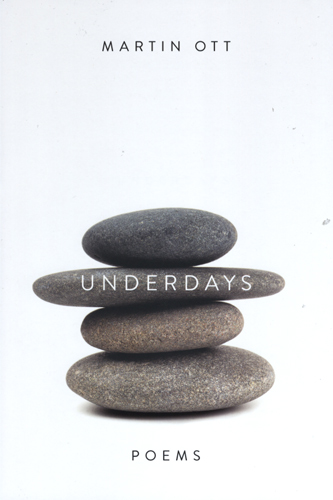 The Ernest Sandeen Prize in Poetry is sponsored by the Creative Writing Program at University of Notre Dame in conjunction with The University of Notre Dame Press. Awarded to authors who have published at least one volume of poetry, winners receive publication and a prize of $1000 dollars.
The Ernest Sandeen Prize in Poetry is sponsored by the Creative Writing Program at University of Notre Dame in conjunction with The University of Notre Dame Press. Awarded to authors who have published at least one volume of poetry, winners receive publication and a prize of $1000 dollars.
The 2015 winner was published last month: Underdays by Martin Ott.
From the publisher’s website: “Underdays is a dialogue of opposing forces: life/death, love/war, the personal/the political. Ott combines global concerns with personal ones, in conversation between poems or within them, to find meaning in his search for what drives us to love and hate each other.”
Ott’s work can be found in The Antioch Review, The Café Review, and Epoch, just to name a few.
To learn more about Underdays, check out the University of Notre Dame Press’s website.
Spread the word!
Broadsided Seeks Syrian Submissions
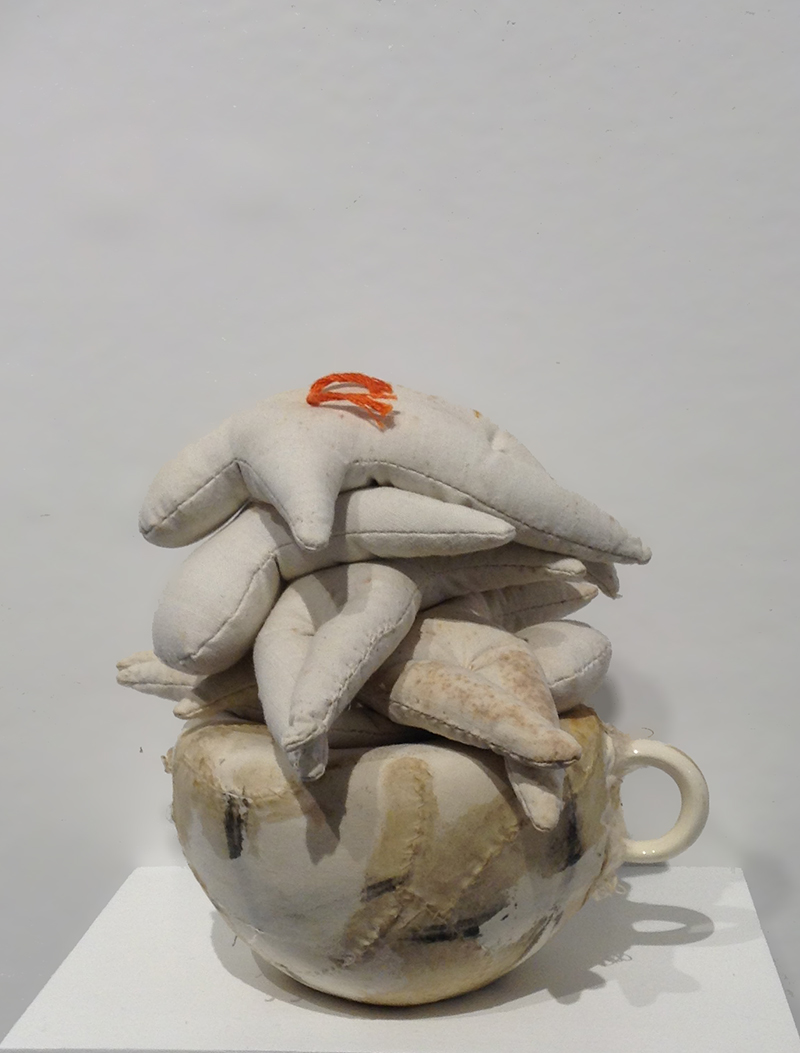 The editors at Broadsided Press continually act on their belief that art and literature belong in our daily lives and that they inspire and demonstrate the vitality and depth of our connection with the world. Their latest effort is no exception to this. They write, “We have watched the news and images of people fleeing, in a large part, war in Syria (the Syrian Civil War)—nearly four million individuals—and the complicated reception of those refugees globally.”
The editors at Broadsided Press continually act on their belief that art and literature belong in our daily lives and that they inspire and demonstrate the vitality and depth of our connection with the world. Their latest effort is no exception to this. They write, “We have watched the news and images of people fleeing, in a large part, war in Syria (the Syrian Civil War)—nearly four million individuals—and the complicated reception of those refugees globally.”
Acting on this event, the editors hope to help writers and artists collaborate to create action outreach. “Five Broadsided Press artists have provided images they’ve created that, for them, speak to the Syrian refugees in a wide sense. We also reached out to artists abroad, and the Syrian artist Moustafa Jacoub offered one of his pieces. We now ask you to respond with words.” [Pictured: Janice Redman, “Buoyancy Study”]
If your piece is chosen, the editors will have a short question or two to ask you about your process and will ask for a photo of your collaboration up in your community. The broadsides will also be available for others to download and post in their communities as well.
The images and specific guidelines for submission can be found on the Broadsided website here. Deadline for submission is October 25, 2015.
Spread the word!
Pittsburgh Poetry Houses
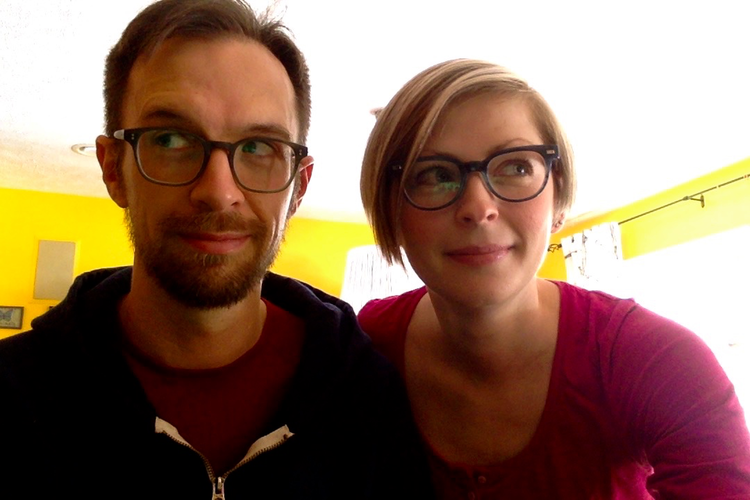 It was only a matter of time before the Little Library idea got hijacked and starting showing up as other cool community Little House outreach. Three Pittsburgh poets, Sarah B. and Jeffrey Boyle [pictured] of Flashbang! Writing Studio and Tess Wilson, received funding from Awesome Pittsburgh to get the Pittsburgh Poetry Houses started.
It was only a matter of time before the Little Library idea got hijacked and starting showing up as other cool community Little House outreach. Three Pittsburgh poets, Sarah B. and Jeffrey Boyle [pictured] of Flashbang! Writing Studio and Tess Wilson, received funding from Awesome Pittsburgh to get the Pittsburgh Poetry Houses started.
The concept is simple: tiny wooden houses will be placed around town; inside will be four poems, each on its own postcard – poem on one side, artwork on the other. The poems will feature one local and one national student poet and one local and one national adult poet. Every two weeks, a new set of four poem postcards will be placed in the Poetry Houses. An archive of poems will be housed on the PPH website, and print collections (bound by a big rubberband) will be available for purchase as Summer and Winter volumes.
The current editors are also looking for readers to join their team, actively searching for “readers who are not: cis, straight, white.” Readers don’t have to live in Pittsburgh, and they should be willing to volunteer about an hour a week to the effort.
Submissions for poetry are currently being accepted, with previously published works considered. See the PPH website for full details.
This seems like another great way to share the love of poetry and reading that I hope will be as equally inspriational as the free libraries!
Spread the word!
Ramifications of War
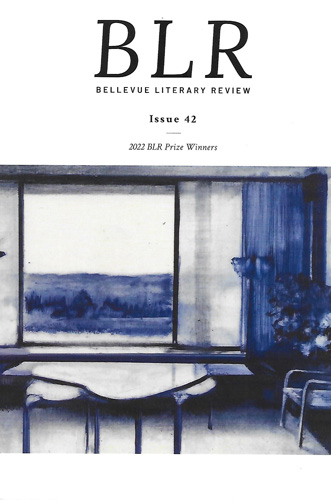 Bellevue Literary Review “a journal of humanity and human experience” published by the NYU Longone Medical Center takes on challenging issues with each publication, some specifically themed, as is the most recent issue: “Embattled: The Ramifications of War.”
Bellevue Literary Review “a journal of humanity and human experience” published by the NYU Longone Medical Center takes on challenging issues with each publication, some specifically themed, as is the most recent issue: “Embattled: The Ramifications of War.”
Fiction Editor Suzanne McConnell writes in the Foreword: “War stories are not only the stories of soldiers and combat, although these are plentiful. Our intention with this issue of the Bellevue Literary Review is to encompass work about a broad spectrum of people affected by war in a myriad of ways, in many places and times. Together, we hope they afford some sense of overview and invite thoughtful considerations of war, and especially – as the title of our theme suggests – its ramifications. … The history of war may be largely written by the victors, but the ramifications of war know no such bounds.”
Read more about the authors and works included here.
Spread the word!
Glimmer Train 2015 Very Short Fiction Award Winners
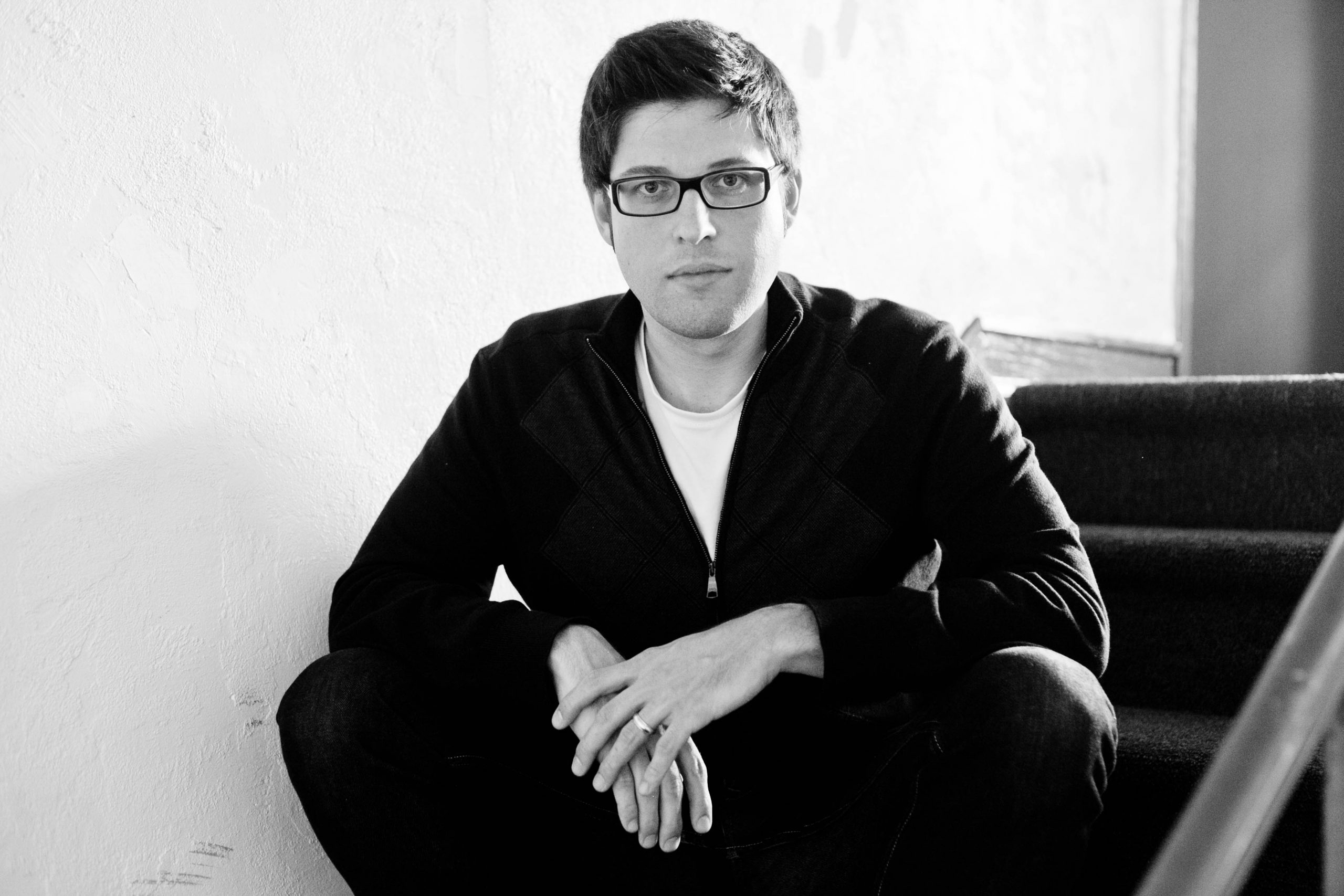 Glimmer Train has just chosen the winning stories for their Very Short Fiction Award. This competition is held annually and is open to all writers for stories with a word count under 3000. The next Very Short Fiction competition will take place in July. Glimmer Train’s monthly submission calendar may be viewed here.
Glimmer Train has just chosen the winning stories for their Very Short Fiction Award. This competition is held annually and is open to all writers for stories with a word count under 3000. The next Very Short Fiction competition will take place in July. Glimmer Train’s monthly submission calendar may be viewed here.
First place: David James Poissant [pictured], of Oviedo, FL, wins $1500 for “Tornado.” His story will be published in Issue 98 of Glimmer Train Stories.
Second place: Adam O’Fallon Price, of Iowa City, IA, wins $500 for “Our Celebrity.”
Third place: Mary Kuryla, of Topanga, CA, wins $300 for “Not in Nottingham.”
A PDF of the Top 25 winners can be found here.
Deadline coming up! Family Matters: September 30
Glimmer Train hosts this competition twice a year. It’s open to all writers for stories about families of any configuration. Most submissions to this category run 1200-5000 words, but can go up to 12,000. Click here for complete guidelines.
Spread the word!
American Life in Poetry :: Michael McFee
American Life in Poetry: Column 548
BY TED KOOSER, U.S. POET LAUREATE
This may be the only poem ever written in which a person claps the mud from a pair of shoes! Michael McFee’s poetry is just that original, in all of his books. His most recent is That Was Oasis (Carnegie Mellon Univ. Press, 2012), and he lives in North Carolina.
Ovation
He stood on his stoop
and clapped her sneakers together
hard, a sharp report,
smacking right sole against left,
trying to shock the mud
from each complicated tread,
spanking those expensive footprints
until clay flakes and plugs
ticked onto the boxwood’s leaves
like a light filthy sleet
from the rubber craters and crannies
where they stuck weeks ago,
until her shoes were banged clean
though that didn’t stop
his stiff-armed slow-motion applause
with her feet’s emptied gloves,
slapping mate against mate
without missing a beat,
half-wishing that hollow sound
echoing off their neighbors’ houses
could call her back.
We do not accept unsolicited submissions. American Life in Poetry is made possible by The Poetry Foundation (www.poetryfoundation.org), publisher of Poetry magazine. It is also supported by the Department of English at the University of Nebraska-Lincoln. Poem copyright ©2010 by Michael McFee, “Ovation,” (River Styx 83, 2010). Poem reprinted by permission of Michael McFee and the publisher. Introduction copyright © 2015 by The Poetry Foundation. The introduction’s author, Ted Kooser, served as United States Poet Laureate Consultant in Poetry to the Library of Congress from 2004-2006.
Spread the word!
Books :: Philip Levine Prize in Poetry
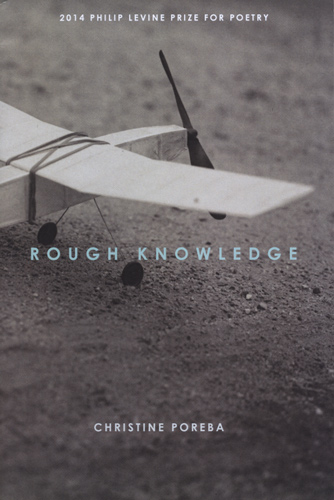 Look forward to Christine Poreba’s Rough Knowledge, winner of the 2014 Philip Levine Prize in Poetry, currently scheduled to be published by Anhinga Press at the beginning of 2016. Rough Knowledge is Poreba’s first book and was chosen from nearly 700 manuscripts by Peter Everwine.
Look forward to Christine Poreba’s Rough Knowledge, winner of the 2014 Philip Levine Prize in Poetry, currently scheduled to be published by Anhinga Press at the beginning of 2016. Rough Knowledge is Poreba’s first book and was chosen from nearly 700 manuscripts by Peter Everwine.
Everwine says of his selection:
[Poreba] has an eye for exact particulars and doesn’t stray from them, but her poems are so transparent, so quiet and intimate with the daily ambiguities and revelations of experience, that if you listen carefully you can almost believe the movement within her poems is like breathing: inward-containment, outward-space. I want such poetry close at hand.
To learn more about Rough Knowledge, check out Fresno State University’s website.
Spread the word!
The MacGuffin Poetry Prize Winners
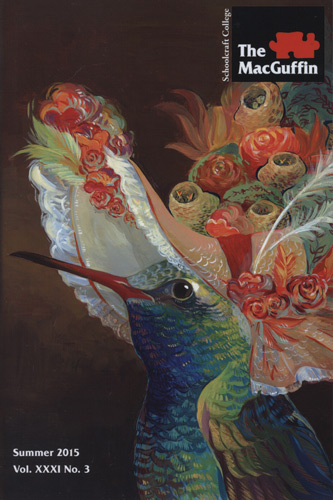 The MacGuffin has announced the winners of their Poetry Prize, which was sponsored at the Detroit Working Writer’s Conference this spring.
The MacGuffin has announced the winners of their Poetry Prize, which was sponsored at the Detroit Working Writer’s Conference this spring.
1st place goes to Kim Geralds for “Each In Her Own Time”
2nd place goes to Melissa “Liza” Young for “’Dreamt’ is the only English word that ends in ‘mt”
3rd place goes to Linda Nemec Foster for “Blue”
Foster’s poetry can be found in the Summer 2015 issue of The MacGuffin. To read the winning pieces, stay tuned for the Winter 2016 edition.
Spread the word!
The Kenyon Review :: Patricia Grodd Poetry Prize for Young Writers
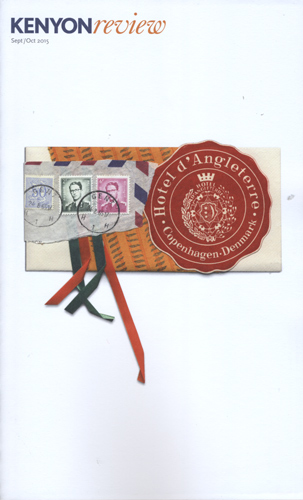 In the September/October issue of The Kenyon Review, find the winners of the 2015 Patricia Grodd Poetry Prize for Young Writers.
In the September/October issue of The Kenyon Review, find the winners of the 2015 Patricia Grodd Poetry Prize for Young Writers.
The Poetry Prize is in its 12th year and “recognizes an outstanding single poem by a high school sophomore or junior.”
1st place goes to Caitlin Chan for her poem “Tlingit Farewell: Glacier Bay, 1966.”
The two runners-up are Gavin Murtha for his poem “I Spent a Lot of Time in There” and Emily Zhang for her poem “Story for the Salt.”
These three pieces, as well as past winners, can be read in full on The Kenyon Review website. The contest opens again at the beginning of November 2015.
Spread the word!
A New Look for Still Point Arts Quarterly
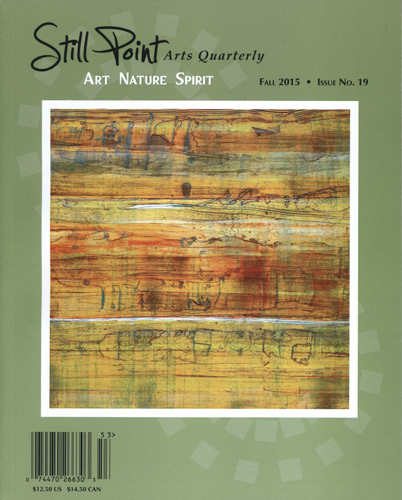 Still Point Arts Quarterly has released its first issue since it absorbed Stone Voices. With the new publication comes a new look (a brighter, more eye-catching cover), and plans to focus on “art, nature, and spirit” while connecting these themes to make a cohesive, enjoyable read. Regular readers will be comforted to know that columnists Peter Azrak, Vincent Louis Carrella, and Leslie Ihde, will continue to write for this version of the Quarterly.
Still Point Arts Quarterly has released its first issue since it absorbed Stone Voices. With the new publication comes a new look (a brighter, more eye-catching cover), and plans to focus on “art, nature, and spirit” while connecting these themes to make a cohesive, enjoyable read. Regular readers will be comforted to know that columnists Peter Azrak, Vincent Louis Carrella, and Leslie Ihde, will continue to write for this version of the Quarterly.
This issue includes samples from Still Point Art Gallery’s current exhibition Rectangles, Triangles, Circles: The Shape of Life and includes more art than ever.
Grab a print copy or a digital subscription at the Still Point website.
Spread the word!
Twitter Poetics
 Last month, Francesco Levato, a new media artist, poet, and director of The Chicago School of Poetics, started #pxc001 to create a collaborative, long-form poem using Twitter as the interactive platform for writers. Although Levato started the work and appears occassionaly throughout thusfar, the poem is driven by its participants, with some using previous entries to build continuing lines. The Poem Twitter Wrote by Emiko Jazuka on VICE Motherboard explains the project.
Last month, Francesco Levato, a new media artist, poet, and director of The Chicago School of Poetics, started #pxc001 to create a collaborative, long-form poem using Twitter as the interactive platform for writers. Although Levato started the work and appears occassionaly throughout thusfar, the poem is driven by its participants, with some using previous entries to build continuing lines. The Poem Twitter Wrote by Emiko Jazuka on VICE Motherboard explains the project.
Spread the word!
Books :: Orison Poetry Prize
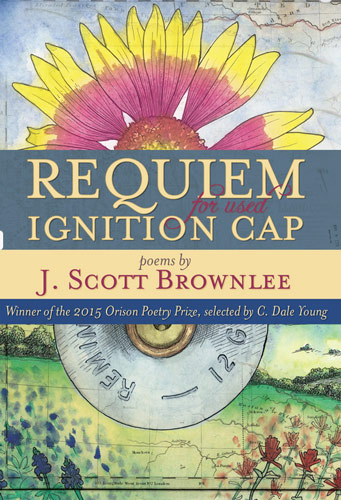 Halfway through November, Orison Books will release J. Scott Brownlee’s debut full-length poetry collection Requiem for Used Ignition Cap, winner of the 2015 Orison Poetry Prize.
Halfway through November, Orison Books will release J. Scott Brownlee’s debut full-length poetry collection Requiem for Used Ignition Cap, winner of the 2015 Orison Poetry Prize.
From the editors: The poems in this collection explore the rural landscape and residents of Brownlee’s native Llano, Texas. Brownlee might be considered a natural mystic, refusing to settle for the simplistic ideological framewo0rk offered by his religious heritage, but rather finding in the particulars of place the vehicles of transcendence.”
Brownlee has been awarded $1,500, along with publication. His poems have appeared in The Kenyon Review, Hayden’s Ferry Review, West Branch, and more.
Find out more at Orison Books’s website.
Spread the word!
Blue Collar Review – Spring 2015
Blue Collar Review: Journal of Progressive Working Class Literature is a small, targeted magazine filled with voices insisting on being heard. The editorial introduction to this issue states, “Poems in this collection speak of both the pride and the misery of work. They flesh out the real insecurity and resentment of underpaid and tenuous jobs and the seeming hopelessness of unemployment.” Continue reading “Blue Collar Review – Spring 2015”
Spread the word!
The American Poetry Review – Sept 2009
The American Poetry Review features poetry, of course, and literary essays that are didactic, exhaustive studies on poets and poems, exploring all possible avenues of meaning from every possible angle. And that’s a good thing. Continue reading “The American Poetry Review – Sept 2009”
Spread the word!
The Missing Slate – 2015
The Missing Slate, based in Islamabad, Pakistan, is an ambitious gathering of ideas from around the world in the form of poetry, essays, and stories, accented with dazzling artwork. This is the first print anthology from the previously online-only forum. Continue reading “The Missing Slate – 2015”
Spread the word!
Indiana Review – Summer 2015
Beautifully produced, Indiana Review has fiction, poetry, nonfiction, and in this issue, something called “Special Folio: Graphic Memoir.” With seven contributors, the Special Folio has the look of a comic book. Bianca Stone has two watercolors that resemble greeting cards. Continue reading “Indiana Review – Summer 2015”
Spread the word!
The Missouri Review – Summer 2015
The theme of this issue of the University of Missouri’s The Missouri Review is “Defy.” Long-time editor Speer Morgan contributes a five-page introduction, which has this sentence: “The best new voices often defy the accepted in the quest for new themes, subjects and possibilities of form.” He then cites Beethoven, Picasso and Jane Austen, all contemporary cultural staples. Likewise, The Missouri Review is mainstream and established. The writers and artists celebrated in this issue—David Mitchell, Michael West and Jacob Riis—are equally so. Continue reading “The Missouri Review – Summer 2015”
Spread the word!
Birmingham Poetry Review – Spring 2015
In addition to offering readers a hefty volume of contemporary poetry from accomplished writers, the Spring 2015 issue of the Birmingham Poetry Review also includes an interview with featured poet Allison Joseph, a couple of useful poetry-focused essays, and a lengthy review section. Continue reading “Birmingham Poetry Review – Spring 2015”
Spread the word!
Stoneboat – 2015
Jumping into Stoneboat, this issue is kicked off by CL Bledsoe’s poem, “The Squeaky Wheel Has Been Anesthetized.” At the end of the poem the speaker says, “[ . . . ] upsetting. I know we’re all dying at our own pace, / just trying to find a comfortable place to lie down.” The ending of the poem links back to the title’s anesthetization, as well as showcases the poem’s buried rhymes, while working as a good opener for this issue. Continue reading “Stoneboat – 2015”
Spread the word!
West Branch – Spring/Summer 2015
West Branch is back with another issue and deserves the attention generally reserved for a select few. Editor G.C. Waldrep and his staff consistently serve up some great writing, and their latest installment is no different. Continue reading “West Branch – Spring/Summer 2015”
Spread the word!
Ploughshares – Summer 2015
Ploughshares has returned with their much anticipated annual fiction issue, which features work from the likes of Lydia Davis and Daniel Pena, as well as some new writers coming into their own. In the introduction, Guest Editor Lauren Groff says she is “hungry for voices that speak to me with real emotion; because real emotion is always new.” One can see that influence in the latest installment, which includes a wide-range of narratives where the characters are dealing with unexpected and sometimes strange incidents that showcase little slices of humanity. Continue reading “Ploughshares – Summer 2015”
Spread the word!
The Southern Review – Summer 2015
Time Magazine once labeled The Southern Review as “superior to any other journal in the English language.” The latest edition published on the campus of the Louisiana State University lives up to the high standards that their readers love and have come to expect since the magazine’s inception in 1935. You will not regret reading this cover to cover. Continue reading “The Southern Review – Summer 2015”
Spread the word!
Chtenia – Summer 2015
The year was 1964 and Leonid Brezhnev had just taken control of the Soviet Union. Nikita Khrushchev had recently been expelled as First Secretary of the Central Committee of the Communist Party of the Soviet Union as well as Chairman of the Council of Ministers, thoroughly ending another era of autocracy in Soviet Russia and ushering in a collective leadership. Leonid Brezhnev and Alexei Kosygin took the stage to powerhouse Russian politics, and henceforth brought about the Era of Stagnation in the USSR, creating hardship and creative inspiration for citizens of the massive state. Continue reading “Chtenia – Summer 2015”
Spread the word!
Mudfish – 2015
This issue of Mudfish opens with the winner of the 11th Mudfish Poetry Prize Chosen by Charles Simic: “Waking Alone on Sunday Morning” by Elisabeth Murawski. Continue reading “Mudfish – 2015”
Spread the word!
Hippocampus – September 2015
Delving into the latest issue of Hippocampus Magazine, I was reminded of You’ve Got Mail and the moment Meg Ryan’s character is told “I remember when your mother gave me Anne of Green Gables. ‘Read it with a box of Kleenex,’ she told me.” So, readers, let me pass on the same warning before checking out the September 2015 issue of Hippocampus: grab some tissues, or at the very least, be prepared to have a lump in your throat for longer than comfortable. Continue reading “Hippocampus – September 2015”
Spread the word!
World Literature Today :: Bodies in Literature
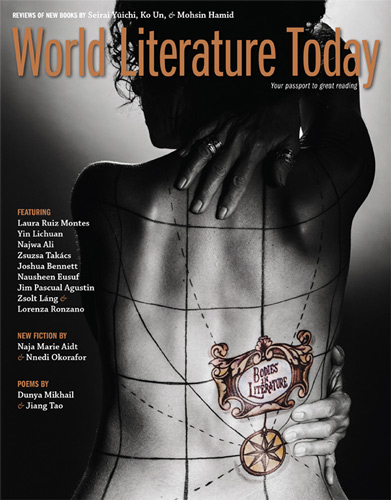 World Literature Today features “Bodies in Literature” for their September-October 2015 issue. The cover art is aptly chosen, and here’s what the editors have to say about their choice:
World Literature Today features “Bodies in Literature” for their September-October 2015 issue. The cover art is aptly chosen, and here’s what the editors have to say about their choice:
In a year marked by protracted conflicts over bodies—women’s bodies, black bodies, immigrant/refugee bodies, and even the body politic—we hoped to capture that zeitgeist in this issue’s marquee section “Bodies in Literature,” by featuring an original cover illustration from tattoo artist Rawb Carter, modeled by Synthia Haddad, and photographed by Shevaun Williams.
The 15-page “Bodies in Literature” features work by Laura Ruiz Montes, Yin Lichuan, Najwa Ali, Zsuzsa Takács, Joshua Bennett, Nausheen Eusuf, Jim Pascual Agustin, Zsolt Láng, and Lorenza Ronzano and has been curated by Sara Wilson who also pens an introduction to the section.
Spread the word!
2015 Poetry Magazine Prizes Announced
Poetry magazine awards eight annual prizes for the best work published in Poetry during the past 12 months.
THE LEVINSON PRIZE $500 awarded to Rae Armantrout for her poems “The Difficulty,” “The Ether,” “Followers,” and “Taking Place” from the January 2015 issue.
THE BESS HOKIN PRIZE $1,000 awarded to Terrance Hayes for “How to Draw a Perfect Circle,” published in the December 2014 issue.
THE FREDERICK BOCK PRIZE $500 awarded to Tarfia Faizullah for “100 Bells” in the January 2015 issue.
THE J. HOWARD AND BARBARA M.J. WOOD PRIZE $5,000 awarded to Jillian Weise for her poems “Future Biometrics” and “Biohack Manifesto” in the March 2015 issue.
THE JOHN FREDERICK NIMS MEMORIAL PRIZE FOR TRANSLATION $500 awarded to Ming Di and Jennifer Stern for their translations of Liu Xia’s poems “Empty Chairs” and “Transformed Creatures” in the November 2014 issue.
THE FRIENDS OF LITERATURE PRIZE $500 awarded to Amy Newman for her poem “Howl” in the July/August 2015 issue.
THE EDITORS PRIZE FOR FEATURE ARTICLE $1,000 awarded to Jenny Zhang for her essay “How It Feels” in the July/August 2015 issue.
THE EDITORS PRIZE FOR REVIEWING $1,000 awarded to Maya Catherine Popa for “Forever Writing from Ireland,” her review of The Architect’s Dream of Winter by Billy Ramsell, This Is Yarrow by Tara Bergin, Scapegoat by Alan Gillis, and Clasp by Doireann Ní Ghríofa in the September 2015 issue.
The prizes are organized and administered by the Poetry Foundation in Chicago, publisher of Poetry magazine. Read these winning entries and browse all past issues of Poetry magazine since 1912 online.
Spread the word!
American Life in Poetry :: Robert King
American Life in Poetry: Column 546
BY TED KOOSER, U.S. POET LAUREATE
They say that when undergoing cancer treatment, the patient’s attitude is all-important. Here Robert King, a poet now living in Colorado, looks with wit and bemusement at his chemotherapy. His most recent book is Some of These Days, (Conundrum Press, 2013).
The Cancer Port
It’s called a port, a harbor, haven, home,
a city on the coast of my chest opened
for a passage into my heart—which we say
is where emotions live—and it’s embedded,
slipped into a shallow nest of flesh, a bump,
a lump under the skin on the right so
the narrow street can reach the marketplace
of the aorta, receptive to any
incoming ship, needle, boat, barge, unloading
its spices, crates of dates, barrels of poisons,
Etoposide phosphate, amethyst, amaranth,
Cisplatin, amphorae of wine and olives.
I carry it secretly under my skin
because it is easier. I carry
everything under my skin, so lightly
I barely notice, watching from the ramparts
the dangerous rocky anchorage below
where goods and evils, bundled together
and tied, arrive, waiting to be unloaded
and poured out into a welcoming country.
We do not accept unsolicited submissions. American Life in Poetry is made possible by The Poetry Foundation (www.poetryfoundation.org), publisher of Poetry magazine. It is also supported by the Department of English at the University of Nebraska-Lincoln. Poem copyright ©2015 by Robert W. King, “Embedding the Cancer Port,” from Nimrod International Journal, (58.2, 2015). Poem reprinted by permission of Robert W. King and the publisher. Introduction copyright © 2015 by The Poetry Foundation. The introduction’s author, Ted Kooser, served as United States Poet Laureate Consultant in Poetry to the Library of Congress from 2004-2006.
Spread the word!
Young Irish Poets in Poetry
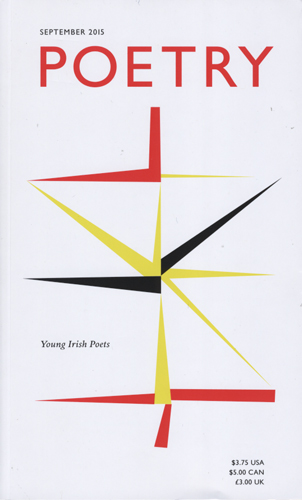 Poetry’s September 2015 issue celebrates Young Irish Poets, the first Irish-themed issue in twenty years. Editor Patrick Cotter reveals a note about the last Irish issue:
Poetry’s September 2015 issue celebrates Young Irish Poets, the first Irish-themed issue in twenty years. Editor Patrick Cotter reveals a note about the last Irish issue:
One notable difference between this issue and the Contemporary Irish Poetry issue of 1995 is how evenly women are represented. In 1995, out of forty poets and translators presented, only six were women.
Yikes. But it’s great to see a change throughout the years and have a more evenly represented section of young Irish poets in this issue.
And with the new Playlist feature on the Poetry Foundation blog, I’m hoping this issue has accompanying music available soon.
Spread the word!
Tampa Book Arts Kickstarter
 The Tampa Book Arts Studio has launched its first-ever Kickstarter campaign for a project that brings an unpublished story of notable American woodcut artist J. J. Lankes into print in a limited letterpress edition.
The Tampa Book Arts Studio has launched its first-ever Kickstarter campaign for a project that brings an unpublished story of notable American woodcut artist J. J. Lankes into print in a limited letterpress edition.
“In 1950, nearing the end of his career as an illustrator and woodcut artist, Lankes wrote an allegorical fable that takes place in the lives of two mice, a story that emphasizes the snares of materialism versus the redeeming strength of love and forgiveness. Lankes also completed two illustrations to accompany it, but both the story and the cuts were set aside. They were never published or even publicly known, and they were nearly lost.” (TBAS blog)
The TBAS is home to Lankes’s c. 1845 Hoe Washington hand press, No. 3126, on which he proofed and printed his blocks for Robert Frost and others. Now, Director Dr. Richard Mathews is overseeing theprint production of Lankes’s story, The Rich Mouse, with illustrations. The book will be set in a special casting “Village” private press typeface in celebration of the 150th anniversary of its creator, Frederic W. Goudy.
Clearly, there is much to celebrate here! And donors can get in on the celebration by contributing to the Kickstarter campaign and receiving some excellent premiums – including a limited letterpress edition of the book itself, broadsides, and a companion paperback copy The Rich Mouse.
Spread the word!
Glimmer Train June Fiction Open Winners :: 2015
Glimmer Train has just chosen the winning stories for their June Fiction Open competition. This competition is held twice a year. Stories generally range from 2000-6000 words, though up to 20,000 is fine. The next Fiction Open will take place in December. Glimmer Train’s monthly submission calendar may be viewed here.
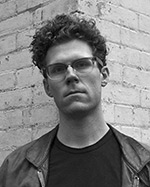 First place: Caleb Leisure [pictured], of Martinez, CA, wins $2500 for “Atlantic on Sunday.” His story will be published in Issue 97 of Glimmer Train Stories.
First place: Caleb Leisure [pictured], of Martinez, CA, wins $2500 for “Atlantic on Sunday.” His story will be published in Issue 97 of Glimmer Train Stories.
Second place: Steven Polansky, of Appleton, WI, wins $1000 for “Obsequies” and publication in a future issue of Glimmer Train Stories.
Third place: Andrew Robinson, of Singapore, wins $600 for “Greater Love.” His story will also be published in a future issue of Glimmer Train Stories, increasing his prize to $700.
A PDF of the Top 25 winners can be found here.
Spread the word!
Changes at Arroyo
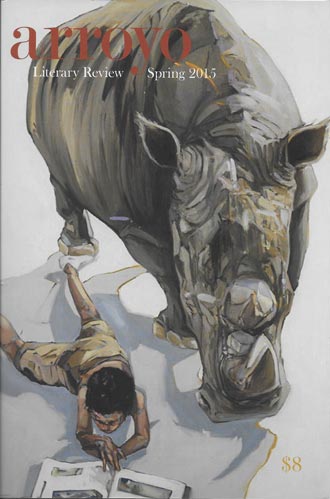 Arroyo presents their first drama piece in their Spring 2015 issue: “Creation of Myself” written by the Costa Rican epic poet, Eunice Odio, and translated by Keith Ekiss. From The Fire’s Journey, a four-part epic poem, the selection follows poet-hero Ion as he prepares to enter the world.
Arroyo presents their first drama piece in their Spring 2015 issue: “Creation of Myself” written by the Costa Rican epic poet, Eunice Odio, and translated by Keith Ekiss. From The Fire’s Journey, a four-part epic poem, the selection follows poet-hero Ion as he prepares to enter the world.
The issue with this “first” for Arroyo also brings around a “last.” Editor Christopher Morgan says good-bye in his Editor’s Note, and Lenae Souza will be stepping in as Editor for Issue 8, set to come out in Spring 2016.
Spread the word!
Committing Theft with Tin House Issue 65
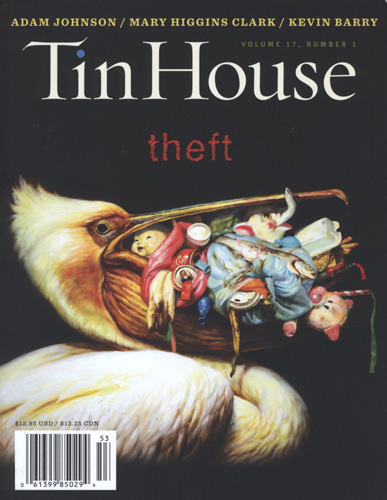 The newest issue of Tin House focuses on the theme of Theft. Kevin Young “looks at how thievery is done well (Bob Dylan) and not so well (Jonah Lehrer).” Mary Ruefle and Erika Metiner take and take apart writing in their erasure poetry and Sarah Dohrmann revisits the 1982 kidnapping of John David Gosch.
The newest issue of Tin House focuses on the theme of Theft. Kevin Young “looks at how thievery is done well (Bob Dylan) and not so well (Jonah Lehrer).” Mary Ruefle and Erika Metiner take and take apart writing in their erasure poetry and Sarah Dohrmann revisits the 1982 kidnapping of John David Gosch.
From the editor’s note:
We sent out a call for short essays about memorable thefts, and it is an honor to have the call answered by the doyen of crime writers, Mary Higgins Clark, alongside Alissa Nutting, George Singleton, and Laura Lippman.
And it’s only appropriate that Martin Wittfooth’s “Loot Bag” dons the cover of this issue: a pelican with its bill filled with the stolen treasures of trash and childhood toys.
Spread the word!
Prayers for the Living
Prayers for the Living is a sprawling novel, a family epic. Written by the late Alan Cheuse, who was a commentator for NPR, his vast conversational experience is apparent throughout the book, which is told through conversation, narrated by a woman named Minnie Bloch, who chronicles the life of her grandson, Manny, and his joys, his struggles, and his demons. Continue reading “Prayers for the Living”
Spread the word!
Illocality
Joseph Massey mentions in the refreshingly spare notes of his fourth collection Illocality that he first encountered his title word in the Emily Dickinson poem “A nearness to Tremendousness.” Dickinson is an apt predecessor for a poet of such deliberate cerebralness. Yet, for his fine command of image, so is William Carlos Williams, or any number of Asian short-form poets. Indeed it is the relationship between logic and image, mind and world, that drives these poems so evenly through their inquiries, that most characterizes their productive tensions. “We think / ourselves here,” Massey writes to close the opening poem “Parse.” Continue reading “Illocality”
Spread the word!
The Guilty
The Guilty by Juan Villoro is the only book of fiction translated into English by this Mexican writer of short stories, novels, plays, essays, and screen scripts. He has been given the Herralde Award in Spain, the Anton Artaud award in France and short-listed for the Reezzori Prize in Italy. In this book of short stories, the individual is in the new global world order, navigating the culture of signs, copies, media, and signifiers of commercial production. Each story is told from a first person point of view, but the “I” does not belong to a specific character with a name, the “I” a transient “I” living in the world through image-manufactured phenomena. Continue reading “The Guilty”
Spread the word!
Love, Sex, and 4-H
I hate sewing. My mother loves it. To save money during my elementary and middle school years, I wore several of her handmade outfits enduring the shaming glances of classmates who, by the mid-80s, were sporting Guess jeans and Ralph Lauren t-shirts. Unlike Oomen’s adolescent experience, 4-H was less cool during mine, nevertheless, my mother enrolled me in a local club at age eleven so I could learn to make my own skirts and, to this day, I can sew a wicked tunnel stitch (though I seldom find good reason to exercise this skill). Continue reading “Love, Sex, and 4-H”
Spread the word!
1001 Facts of Prehistoric Life
You might want to bone up on the Arabian Nights stories, particularly Scheherazade and her sister Dinarzade’s tale, before delving into Jo Ann Clark’s poetic take on the siblings. In 1001 Facts of Prehistoric Life, Clark’s first book, she mixes the fable with some prehistoric fellows and a dash of mythology to present a really interesting set of works. Confession: I had to look up some words, such as viviparity, monotreme, Hypohippus, Merychippus, and mokoro. But once that was in order, a second reading of Clark’s book brought it to life. Continue reading “1001 Facts of Prehistoric Life”
Spread the word!
One Morning—
Wolff’s One Morning— sat in my possession in a very raw state. The captivating parts of the poems were laid out and exposed. It was easy to see the mechanics and the utility of every phoneme and word. This is a highly refined piece of work from a woman very much in control of her craft. The level of Rebecca Wolff’s control shines through in the entire piece. There is juxtaposition in each sentence and stanza. “Traveller, / Your journey has been long // and sectional.” Those introductory lines in “Arcadia (et in . . . est)” bear the weight of repetition. They are full of heart and compassion, yet still quite cerebral. There are always dualities to be explored and explained. Wolff demonstrates the relation between the two as often as she can locate it: “By night everything seems impossible // By day, by extension, everything: possible.” Continue reading “One Morning—”
Spread the word!
Sentences and Rain
Elaine Equi’s latest book, Sentences and Rain, feels like a confident drift. There is so much control and purpose in the playful word ideas. She must be listed among many of the greats. The insights into humanity that are contained in each and every poem remind the reader of the wonder tucked in every corner of life. The words and format are gentle and full of utility. This is the way of those who hold the passage. Equi has pushed her pen for many years. The development is original and organic. One need not read Equi’s previous writing to get the impression that this is a writer and an observer of life in the peak of their critique. Continue reading “Sentences and Rain”
